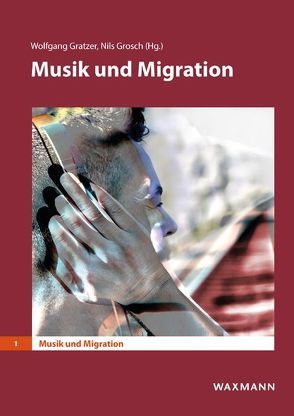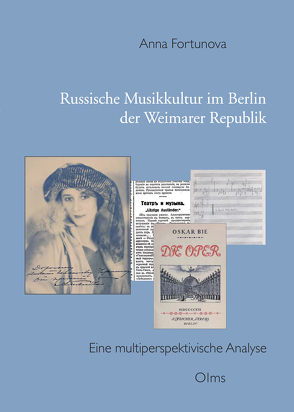
Den russischen Emigranten im Berlin der 1920er und 30er Jahre war ihre Musik und Kultur eine zentrale Stütze, um mit dem Verlust der Heimat umzugehen, wie zahlreiche russischsprachige Quellen belegen. In der deutschen Musikkritik offenbaren sich neben Anerkennung künstlerischer Leistungen auch Klischees und Vorurteile über russische Kultur und Musik – etwa die Vorstellung, in ihnen spiegele sich die „Barbarei“ und „Wildheit“ Russlands. Die Autorin greift auf Grundlage einer Vielzahl von Quellen sowohl russische als auch deutsche Perspektiven auf und wirft so ein Licht auf heute noch aktuelle Fragen von Kultur und Migration.****************For Russian émigrés in 1920s and 1930s Berlin, their music and culture were a central support in dealing with the loss of their homeland, as many Russian sources demonstrate. German music criticism recognises Russian artistic achievements but also expresses clichés and prejudices about Russian culture and music – for example the idea that they reflect Russia’s “barbarism” and “wildness”. Anna Fortunova examines both Russian and German perspectives on the basis of a number of sources, and sheds light on questions relating to culture and migration that remain valid today.
Aktualisiert: 2023-06-30
> findR *
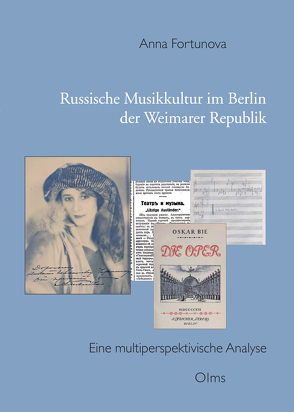
Den russischen Emigranten im Berlin der 1920er und 30er Jahre war ihre Musik und Kultur eine zentrale Stütze, um mit dem Verlust der Heimat umzugehen, wie zahlreiche russischsprachige Quellen belegen. In der deutschen Musikkritik offenbaren sich neben Anerkennung künstlerischer Leistungen auch Klischees und Vorurteile über russische Kultur und Musik – etwa die Vorstellung, in ihnen spiegele sich die „Barbarei“ und „Wildheit“ Russlands. Die Autorin greift auf Grundlage einer Vielzahl von Quellen sowohl russische als auch deutsche Perspektiven auf und wirft so ein Licht auf heute noch aktuelle Fragen von Kultur und Migration.****************For Russian émigrés in 1920s and 1930s Berlin, their music and culture were a central support in dealing with the loss of their homeland, as many Russian sources demonstrate. German music criticism recognises Russian artistic achievements but also expresses clichés and prejudices about Russian culture and music – for example the idea that they reflect Russia’s “barbarism” and “wildness”. Anna Fortunova examines both Russian and German perspectives on the basis of a number of sources, and sheds light on questions relating to culture and migration that remain valid today.
Aktualisiert: 2023-06-30
> findR *
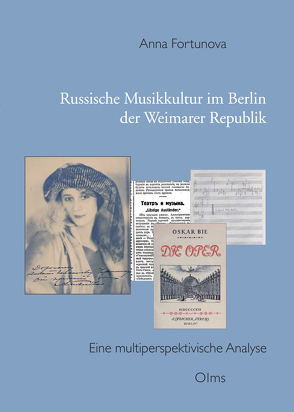
Den russischen Emigranten im Berlin der 1920er und 30er Jahre war ihre Musik und Kultur eine zentrale Stütze, um mit dem Verlust der Heimat umzugehen, wie zahlreiche russischsprachige Quellen belegen. In der deutschen Musikkritik offenbaren sich neben Anerkennung künstlerischer Leistungen auch Klischees und Vorurteile über russische Kultur und Musik – etwa die Vorstellung, in ihnen spiegele sich die „Barbarei“ und „Wildheit“ Russlands. Die Autorin greift auf Grundlage einer Vielzahl von Quellen sowohl russische als auch deutsche Perspektiven auf und wirft so ein Licht auf heute noch aktuelle Fragen von Kultur und Migration.****************For Russian émigrés in 1920s and 1930s Berlin, their music and culture were a central support in dealing with the loss of their homeland, as many Russian sources demonstrate. German music criticism recognises Russian artistic achievements but also expresses clichés and prejudices about Russian culture and music – for example the idea that they reflect Russia’s “barbarism” and “wildness”. Anna Fortunova examines both Russian and German perspectives on the basis of a number of sources, and sheds light on questions relating to culture and migration that remain valid today.
Aktualisiert: 2023-06-30
> findR *
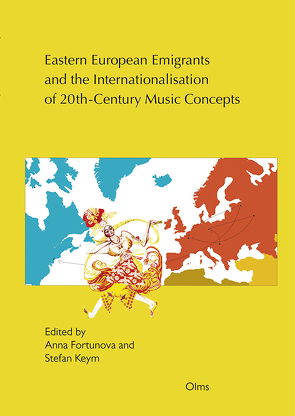
The history of 20th-century music is particularly characterized by the phenomenon of emigration – often for political reasons, such as the persecution of musicians by totalitarian regimes. Many of these musical emigrants came from Eastern European countries. They also transferred their artistic and cultural heritage to their temporary or long-term host countries, where their music concepts came into interaction with local traditions and thus contributed to the internationalisation and global melting of ideas.
This collective publication reinvestigates the paths of these émigré composers, music scholars and other artists. It examines their more or less fruitful interaction with their host cultures as well as their impact on the rise of new global trends of culture. A large part of the 14 articles, written by musicologists and other scholars from six countries, is dedicated to Russian émigrés who left their country after or even before the October Revolution. This first part is complemented by case studies on Slovenian, Czech, Polish, Lithuanian and Hungarian musicians, from the avant-garde to popular music cultures.
Aktualisiert: 2023-06-30
> findR *
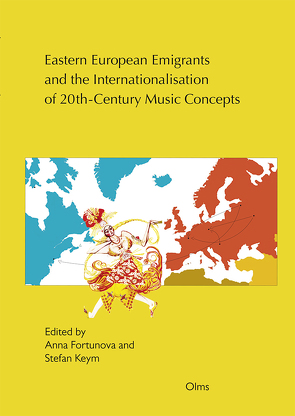
The history of 20th-century music is particularly characterized by the phenomenon of emigration – often for political reasons, such as the persecution of musicians by totalitarian regimes. Many of these musical emigrants came from Eastern European countries. They also transferred their artistic and cultural heritage to their temporary or long-term host countries, where their music concepts came into interaction with local traditions and thus contributed to the internationalisation and global melting of ideas.
This collective publication reinvestigates the paths of these émigré composers, music scholars and other artists. It examines their more or less fruitful interaction with their host cultures as well as their impact on the rise of new global trends of culture. A large part of the 14 articles, written by musicologists and other scholars from six countries, is dedicated to Russian émigrés who left their country after or even before the October Revolution. This first part is complemented by case studies on Slovenian, Czech, Polish, Lithuanian and Hungarian musicians, from the avant-garde to popular music cultures.
Aktualisiert: 2023-06-30
> findR *
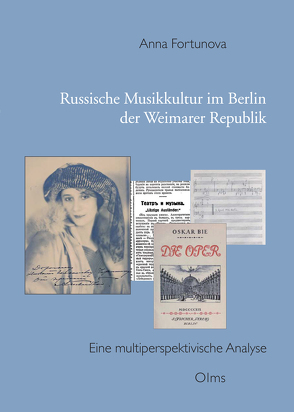
Den russischen Emigranten im Berlin der 1920er und 30er Jahre war ihre Musik und Kultur eine zentrale Stütze, um mit dem Verlust der Heimat umzugehen, wie zahlreiche russischsprachige Quellen belegen. In der deutschen Musikkritik offenbaren sich neben Anerkennung künstlerischer Leistungen auch Klischees und Vorurteile über russische Kultur und Musik – etwa die Vorstellung, in ihnen spiegele sich die „Barbarei“ und „Wildheit“ Russlands. Die Autorin greift auf Grundlage einer Vielzahl von Quellen sowohl russische als auch deutsche Perspektiven auf und wirft so ein Licht auf heute noch aktuelle Fragen von Kultur und Migration.****************For Russian émigrés in 1920s and 1930s Berlin, their music and culture were a central support in dealing with the loss of their homeland, as many Russian sources demonstrate. German music criticism recognises Russian artistic achievements but also expresses clichés and prejudices about Russian culture and music – for example the idea that they reflect Russia’s “barbarism” and “wildness”. Anna Fortunova examines both Russian and German perspectives on the basis of a number of sources, and sheds light on questions relating to culture and migration that remain valid today.
Aktualisiert: 2023-06-29
> findR *
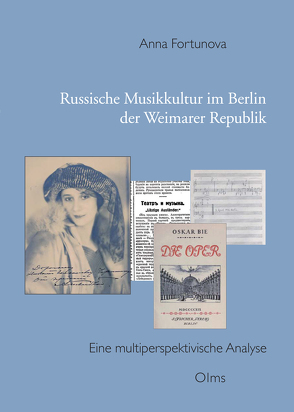
Den russischen Emigranten im Berlin der 1920er und 30er Jahre war ihre Musik und Kultur eine zentrale Stütze, um mit dem Verlust der Heimat umzugehen, wie zahlreiche russischsprachige Quellen belegen. In der deutschen Musikkritik offenbaren sich neben Anerkennung künstlerischer Leistungen auch Klischees und Vorurteile über russische Kultur und Musik – etwa die Vorstellung, in ihnen spiegele sich die „Barbarei“ und „Wildheit“ Russlands. Die Autorin greift auf Grundlage einer Vielzahl von Quellen sowohl russische als auch deutsche Perspektiven auf und wirft so ein Licht auf heute noch aktuelle Fragen von Kultur und Migration.****************For Russian émigrés in 1920s and 1930s Berlin, their music and culture were a central support in dealing with the loss of their homeland, as many Russian sources demonstrate. German music criticism recognises Russian artistic achievements but also expresses clichés and prejudices about Russian culture and music – for example the idea that they reflect Russia’s “barbarism” and “wildness”. Anna Fortunova examines both Russian and German perspectives on the basis of a number of sources, and sheds light on questions relating to culture and migration that remain valid today.
Aktualisiert: 2023-06-29
> findR *
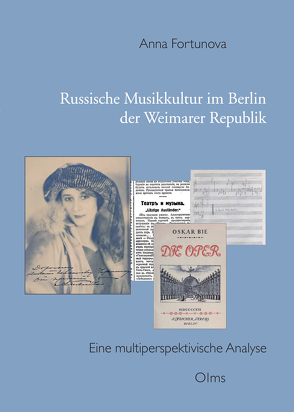
Den russischen Emigranten im Berlin der 1920er und 30er Jahre war ihre Musik und Kultur eine zentrale Stütze, um mit dem Verlust der Heimat umzugehen, wie zahlreiche russischsprachige Quellen belegen. In der deutschen Musikkritik offenbaren sich neben Anerkennung künstlerischer Leistungen auch Klischees und Vorurteile über russische Kultur und Musik – etwa die Vorstellung, in ihnen spiegele sich die „Barbarei“ und „Wildheit“ Russlands. Die Autorin greift auf Grundlage einer Vielzahl von Quellen sowohl russische als auch deutsche Perspektiven auf und wirft so ein Licht auf heute noch aktuelle Fragen von Kultur und Migration.****************For Russian émigrés in 1920s and 1930s Berlin, their music and culture were a central support in dealing with the loss of their homeland, as many Russian sources demonstrate. German music criticism recognises Russian artistic achievements but also expresses clichés and prejudices about Russian culture and music – for example the idea that they reflect Russia’s “barbarism” and “wildness”. Anna Fortunova examines both Russian and German perspectives on the basis of a number of sources, and sheds light on questions relating to culture and migration that remain valid today.
Aktualisiert: 2023-06-29
> findR *
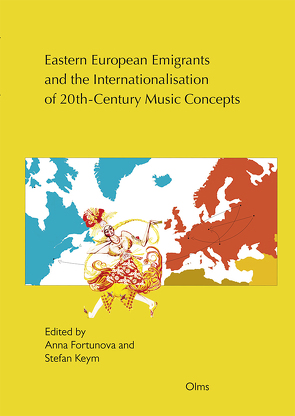
The history of 20th-century music is particularly characterized by the phenomenon of emigration – often for political reasons, such as the persecution of musicians by totalitarian regimes. Many of these musical emigrants came from Eastern European countries. They also transferred their artistic and cultural heritage to their temporary or long-term host countries, where their music concepts came into interaction with local traditions and thus contributed to the internationalisation and global melting of ideas.
This collective publication reinvestigates the paths of these émigré composers, music scholars and other artists. It examines their more or less fruitful interaction with their host cultures as well as their impact on the rise of new global trends of culture. A large part of the 14 articles, written by musicologists and other scholars from six countries, is dedicated to Russian émigrés who left their country after or even before the October Revolution. This first part is complemented by case studies on Slovenian, Czech, Polish, Lithuanian and Hungarian musicians, from the avant-garde to popular music cultures.
Aktualisiert: 2023-06-29
> findR *
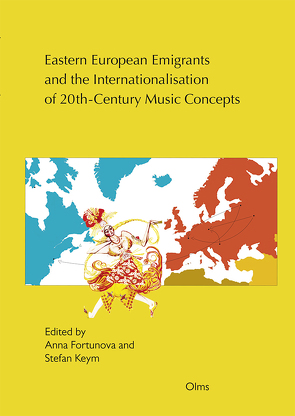
The history of 20th-century music is particularly characterized by the phenomenon of emigration – often for political reasons, such as the persecution of musicians by totalitarian regimes. Many of these musical emigrants came from Eastern European countries. They also transferred their artistic and cultural heritage to their temporary or long-term host countries, where their music concepts came into interaction with local traditions and thus contributed to the internationalisation and global melting of ideas.
This collective publication reinvestigates the paths of these émigré composers, music scholars and other artists. It examines their more or less fruitful interaction with their host cultures as well as their impact on the rise of new global trends of culture. A large part of the 14 articles, written by musicologists and other scholars from six countries, is dedicated to Russian émigrés who left their country after or even before the October Revolution. This first part is complemented by case studies on Slovenian, Czech, Polish, Lithuanian and Hungarian musicians, from the avant-garde to popular music cultures.
Aktualisiert: 2023-06-29
> findR *
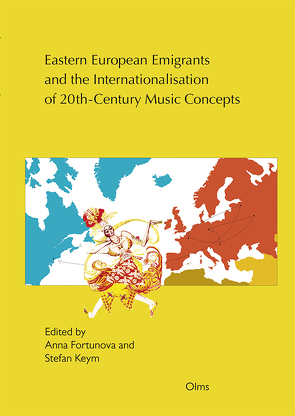
The history of 20th-century music is particularly characterized by the phenomenon of emigration – often for political reasons, such as the persecution of musicians by totalitarian regimes. Many of these musical emigrants came from Eastern European countries. They also transferred their artistic and cultural heritage to their temporary or long-term host countries, where their music concepts came into interaction with local traditions and thus contributed to the internationalisation and global melting of ideas.
This collective publication reinvestigates the paths of these émigré composers, music scholars and other artists. It examines their more or less fruitful interaction with their host cultures as well as their impact on the rise of new global trends of culture. A large part of the 14 articles, written by musicologists and other scholars from six countries, is dedicated to Russian émigrés who left their country after or even before the October Revolution. This first part is complemented by case studies on Slovenian, Czech, Polish, Lithuanian and Hungarian musicians, from the avant-garde to popular music cultures.
Aktualisiert: 2022-10-31
> findR *
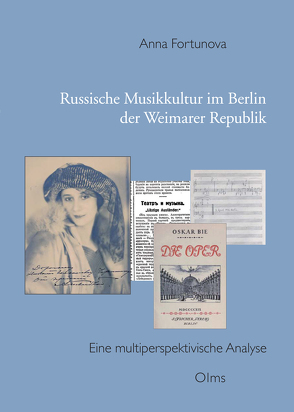
Den russischen Emigranten im Berlin der 1920er und 30er Jahre war ihre Musik und Kultur eine zentrale Stütze, um mit dem Verlust der Heimat umzugehen, wie zahlreiche russischsprachige Quellen belegen. In der deutschen Musikkritik offenbaren sich neben Anerkennung künstlerischer Leistungen auch Klischees und Vorurteile über russische Kultur und Musik – etwa die Vorstellung, in ihnen spiegele sich die „Barbarei“ und „Wildheit“ Russlands. Die Autorin greift auf Grundlage einer Vielzahl von Quellen sowohl russische als auch deutsche Perspektiven auf und wirft so ein Licht auf heute noch aktuelle Fragen von Kultur und Migration.****************For Russian émigrés in 1920s and 1930s Berlin, their music and culture were a central support in dealing with the loss of their homeland, as many Russian sources demonstrate. German music criticism recognises Russian artistic achievements but also expresses clichés and prejudices about Russian culture and music – for example the idea that they reflect Russia’s “barbarism” and “wildness”. Anna Fortunova examines both Russian and German perspectives on the basis of a number of sources, and sheds light on questions relating to culture and migration that remain valid today.
Aktualisiert: 2023-01-27
> findR *
Programmatisch trägt der eröffnende Band 1 den gleichen Titel wie die Reihe selbst. Er versammelt die Beiträge einer wissenschaftlichen Tagung in Salzburg im Oktober 2016. Die Diskussionsbeiträge zeigen das große Spektrum möglicher Zugänge auf: Enthalten sind theoretische und methodische Überlegungen sowie Fallbeispiele musikwissenschaftlicher Migrationsforschung.
Aktualisiert: 2021-01-23
Autor:
Anja K. Arend,
Mirijam Beier,
Daniel Brandenburg,
Anja Brunner,
Sandra Chatterjee,
Marko Deisinger,
Sophie Fetthauer,
Anna Fortunova,
Saeedeh Ghazi,
Wolfgang Gratzer,
Nils Grosch,
Paul Harm,
Marie Louise Herzfeld-Schild,
Marie-Anne Kohl,
Kyungboon Lee,
Magdalena Marschütz,
Ulrike Präger,
Sean Prieske,
Christina Richter-Ibáñez,
Christina Scuderi,
Carolin Stahrenberg,
Melanie Unseld,
Anna K. Windisch,
Ingeborg Zechner,
Gesa zur Nieden
MEHR ANZEIGEN
Bücher von Fortunova, Anna
Sie suchen ein Buch oder Publikation vonFortunova, Anna ? Bei Buch findr finden Sie alle Bücher Fortunova, Anna.
Entdecken Sie neue Bücher oder Klassiker für Sie selbst oder zum Verschenken. Buch findr hat zahlreiche Bücher
von Fortunova, Anna im Sortiment. Nehmen Sie sich Zeit zum Stöbern und finden Sie das passende Buch oder die
Publiketion für Ihr Lesevergnügen oder Ihr Interessensgebiet. Stöbern Sie durch unser Angebot und finden Sie aus
unserer großen Auswahl das Buch, das Ihnen zusagt. Bei Buch findr finden Sie Romane, Ratgeber, wissenschaftliche und
populärwissenschaftliche Bücher uvm. Bestellen Sie Ihr Buch zu Ihrem Thema einfach online und lassen Sie es sich
bequem nach Hause schicken. Wir wünschen Ihnen schöne und entspannte Lesemomente mit Ihrem Buch
von Fortunova, Anna .
Fortunova, Anna - Große Auswahl an Publikationen bei Buch findr
Bei uns finden Sie Bücher aller beliebter Autoren, Neuerscheinungen, Bestseller genauso wie alte Schätze. Bücher
von Fortunova, Anna die Ihre Fantasie anregen und Bücher, die Sie weiterbilden und Ihnen wissenschaftliche Fakten
vermitteln. Ganz nach Ihrem Geschmack ist das passende Buch für Sie dabei. Finden Sie eine große Auswahl Bücher
verschiedenster Genres, Verlage, Schlagworte Genre bei Buchfindr:
Unser Repertoire umfasst Bücher von
Sie haben viele Möglichkeiten bei Buch findr die passenden Bücher für Ihr Lesevergnügen zu entdecken. Nutzen Sie
unsere Suchfunktionen, um zu stöbern und für Sie interessante Bücher in den unterschiedlichen Genres und Kategorien
zu finden. Neben Büchern von Fortunova, Anna und Büchern aus verschiedenen Kategorien finden Sie schnell und
einfach auch eine Auflistung thematisch passender Publikationen. Probieren Sie es aus, legen Sie jetzt los! Ihrem
Lesevergnügen steht nichts im Wege. Nutzen Sie die Vorteile Ihre Bücher online zu kaufen und bekommen Sie die
bestellten Bücher schnell und bequem zugestellt. Nehmen Sie sich die Zeit, online die Bücher Ihrer Wahl anzulesen,
Buchempfehlungen und Rezensionen zu studieren, Informationen zu Autoren zu lesen. Viel Spaß beim Lesen wünscht Ihnen
das Team von Buchfindr.












